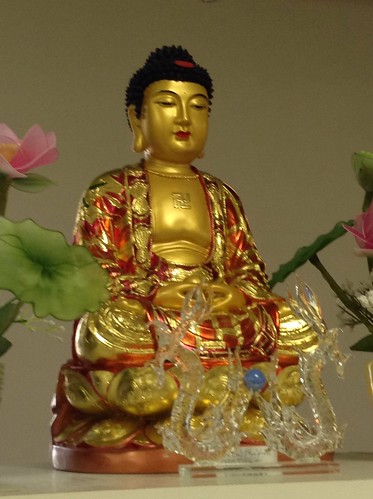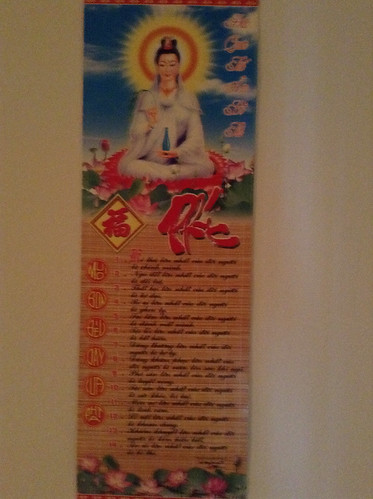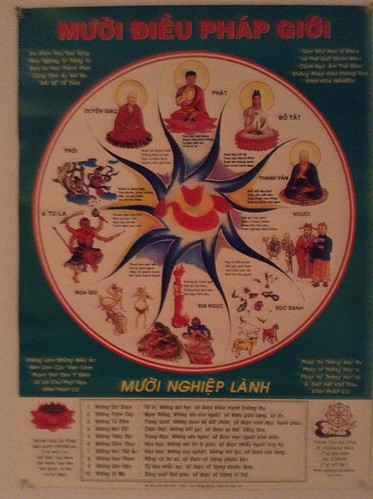|
They're pretty widely considered a cult. Is there any other group in your area?
|
|
|
|
|

|
| # ? May 15, 2024 06:23 |
|
There's a Friends of the Western Buddhist Order group in a fairly inconvenient location, but I believed they've been accused of cultish behaviour too?
|
|
|
|
Tubba Blubba posted:Your statement assumes the ego is an actual entity and not a delusion created by individuals and perpetuated by society. So no, it does not. I've been reading a lot of U.G. Krishnamurti, he's not a Buddhist, he's actually not anything at all, he's like the ultimate spiritual troll. Throwing monkey wrenches in everybody's ideas. You can read his books and interviews here: http://www.well.com/~jct/ Very few Buddhists today speak as real as he did. He is absolutely uncompromising, and therefore totally deflating. Kindof hard to take at times, but reading him has been very helpful to me as I keep learning how to get out of my own way.
|
|
|
|
Rat Flavoured Rats posted:I was wondering if anyone here had any experience or contact with groups affiliated with the New Kadampa Tradition (NKT)? I've been practicing meditation on my own for a few weeks now and think I would benefit from going to a more structured group, and the nearest one to me is an NKT centre. I've read online and seen some of the controversies they've been involved in, but was wondering how much that affected individual groups? Forget groups. Forget meditation centers that don't have actual teachers. Forget books past a certain point. Just forget all of the rabble, and seek out people who "live it". They exist, and they will all (try to) show you the error of your own ways up until this point, each in their own little way. I can think of a few offhand who are still alive today, but there are always more than you would think. Find people who sound like "the real deal", and trust your own judgement on this matter. It's always possible to get sucked into a cultish situation, but just keep doubting yourself. Because doubt is what set you out on this path. You think something is wrong. If you don't think something is wrong, then just read self-help books and feel good about yourself and try to get rich I guess. If you aren't serious, then don't go down the Buddhist path. It's got nothing for those who are searching for new experiences. It is, however, for those who are capital T tired (or more descriptively, existentially flailing around), and don't know the next step. And if you aren't to that point but feel you could be, then this path is also for you. Again, find real teachers. Forget the groups of the blind leading the blind, because those are absolutely everywhere, and they never get called out as such. You have to make the distinction yourself, and keep adjusting your criteria of what seems worthwhile and what seems worthless. Don't be afraid to make judgements, just don't be sanctimonious or a jerk unnecessarily. That's how I feel anyway. That's all I have, hope you all see my point. If you disagree, tough, I've said what I had to say. the worst thing is fucked around with this message at 01:28 on Nov 1, 2013 |
|
|
|
I've been to the NKT in Arlington, tx a few times. The lay people seem to idolize the teacher a little too much, the meditation class is good, but as soon as the chanting (singing) starts the cult vibe really shows. But, it's very accessible and the people there are very welcoming, kinda feels like the suburban Costco of Buddhism, it's almost too easy and the inexperience of the teacher is obvious. I like the idea of finding a good teacher. standardtoaster fucked around with this message at 02:23 on Nov 3, 2013 |
|
|
|
The-Mole posted:Also there was a pretty good quote from a long-dead Buddhist woman (lightly paraphrased), Do you know the source for this quote? I'd like to read more about her and her thoughts.
|
|
|
|
A while ago, I offered to post in this thread about the perspective of someone raised Buddhist by parents from Asia, but then I forgot about the thread until ashgrommies PMed me. And then I forgot about the PM. Quantumfate posted:Do you still engage in practise? When you grew up, how much "high" buddhism did you encounter vs just following lay rituals?  And now that I'm rambling, I do remember my mom telling me it was better to be Buddhist than Catholic because we didn't have to go to temple every week. And now that I'm rambling, I do remember my mom telling me it was better to be Buddhist than Catholic because we didn't have to go to temple every week. One thing that I've noticed reading through this thread is that you guys talk about mediation a lot. I guess that's one of the appeals coming from an outside tradition? I don't meditate and I don't know any layperson that meditates.  Do you guys interact often with (for lack of a better phrase) immigrant Buddhists? What's the ethnic make-up like of converts in your area? Do you guys interact often with (for lack of a better phrase) immigrant Buddhists? What's the ethnic make-up like of converts in your area?You can ask me anything and I'll try to sift through the cobwebs in my brain. I also have stories about vegan Buddhist restaurants and unfinished temples to share if you guys want as well. 
|
|
|
|
How would someone who was not a monk who meditated be perceived in that community? Or would they not really care? Keep rambling and tell your stories, I'm interested.
|
|
|
|
Autumncomet posted:A while ago, I offered to post in this thread about the perspective of someone raised Buddhist by parents from Asia, but then I forgot about the thread until ashgrommies PMed me. And then I forgot about the PM. the worst thing is fucked around with this message at 19:15 on Nov 7, 2013 |
|
|
|
I am thrilled to hear from someone who is culturally Buddhist but not from Tibet, and am looking forward to more information on how it looks to the laity elsewhere in Asia.
|
|
|
|
Sorry if this is a bad question, but I'm still confused at how Buddhists perceive death. Ya'll reject the self, so when the body dies the self dies right? Essentially Naturalism? But rebirth is essential to Buddhism, so what is continued? It's not just "my matter goes to other organisms" is it? I have a feeling it's related to a misunderstanding of a "mind-stream." Sorry if this is insulting or anything. I try to read the Wiki pages and my eyes glaze over.
|
|
|
|
PrinceRandom posted:Sorry if this is a bad question, but I'm still confused at how Buddhists perceive death. No, its not like naturalism. Naturalistic atheists believe that we do have a self, but that this self is annihilated when we die. But Buddhists don't believe in a self, so what can possibly be annihilated? Buddhists believe that we're ultimately just a bundle of perceptions, sensations, mental and emotional states, etc. When you really examine yourself, you find that there's no aspect of yourself that you can really call "you". You have memories, thoughts, inclinations, a physical body (which is in turn made up of constituent parts, none of which are really you), but there's no true self at the center of it all. So there's nothing to be annihilated when we die, because there was never anything really there to begin with.
|
|
|
|
PrinceRandom posted:Sorry if this is a bad question, but I'm still confused at how Buddhists perceive death. Blue Star posted:You have memories, thoughts, inclinations, a physical body (which is in turn made up of constituent parts, none of which are really you), but there's no true self at the center of it all. So there's nothing to be annihilated when we die, because there was never anything really there to begin with. the worst thing is fucked around with this message at 19:18 on Nov 11, 2013 |
|
|
|
Another thought, I think part of the issue that many have in trying to understand Buddhism is that they are seeing it through a Judeo-Christian lens. Not so much theistic versus non-theistic, which is in the end an unhelpful distinction in order to really understand Buddhism, but in terms of something more subtle. At its core, Buddhism is not about beliefs as such. It is helpful to see the teachings as pragmatic (instead of ideological) and to apply them to your life, but there is something else too. The overall picture of Buddhism cannot be described in terms of its ultimate beliefs or goals, like enlightenment. It is better understood as the unsaid perspective that the practice wants you to adopt in your life. The reading between the lines, and the inferred conclusions of certain teachings and beliefs. It can be understood from the ground up, but organically, and it cannot be understood from the overall picture of "there is nirvana and samsara, and because samsara is suffering itself, we aim towards nirvanic freedom", because while that is a portion, it misses the entire point. The untold perspective that brings you to understand why the Buddha taught the eightfold path and not another path, and the four noble truths and not some other ones. Not that it's a secret, but it's something better felt than expressed. At the end of the day you may never find someone who makes the implicit explicit, because they know it is inexpressible. And those who attempt to express it must know in a certain way they are like a bull in a china shop. Search for that unsaid perspective and the implicit inferences of the explicit teachings. Approaching Buddhism from the angle of "this is what they believe, and this is what they don't" will not be fruitful. When it comes to these kinds of teachings, what is implied tends to generally be the most important. I think this approach is necessary for all religious study in fact, the mystical traditions especially.
|
|
|
|
There's a definite reason they say that a person's efforts are best spent learning about and following a single path, tradition, or practice. At least for the first couple of decades. Get one down good and take all the 'support practice' seriously. That support stuff generally comes down to: take good care of (and in the process, get to know) yourself and others, physically and mentally; be honest and stand up for whatever you believe is worth standing up for; try to let the virtuous qualities that comprise that eightfold path be a little more present in how you go about life, day to day. If you're unwilling to give up things that cause harm, at least let yourself be guided by the spirit of harm reduction, though it only puts off the inevitable. Try not to assume too much and examine old assumptions whenever one comes to our attention. And to close with the Buddha's own words, "Scrutinize spiritual teachers the way a gold merchant examines gold before buying it." Herstory Begins Now fucked around with this message at 22:39 on Nov 11, 2013 |
|
|
|
ObamaCaresHugSquad posted:And this constructed self can continue from rebirth to rebirth, whether as an animal, human, hungry ghost, hell demon, or a god. These are all the realms of existence in many forms of Buddhism. They can be taken literally, or figuratively, for instance seeing states of mind as representations of different realms. Anyway, if this constructed self is seen as not inherently self-existent in this lifetime, it will not continue past death. As long as it is assumed to be self-existent, it will continue on. All that's needed is to recall just one past life, never mind thousands, to understand that this is a fatuous notion, and I'm calling bullshit on 'figuratively'. Figuratively is for Westerners who can't deal. You don't just assume intellectually you are existent or not-existent. Your samskaras and karma will go on regardless of what you think. The-Mole posted:There's a definite reason they say that a person's efforts are best spent learning about and following a single path, tradition, or practice. At least for the first couple of decades. Get one down good and take all the 'support practice' seriously. That support stuff generally comes down to: take good care of (and in the process, get to know) yourself and others, physically and mentally; be honest and stand up for whatever you believe is worth standing up for; try to let the virtuous qualities that comprise that eightfold path be a little more present in how you go about life, day to day. If you're unwilling to give up things that cause harm, at least let yourself be guided by the spirit of harm reduction, though it only puts off the inevitable. Little-known fact: the Buddha had 2 teachers he discarded along his way because they did not satisfy him....there is a very fine line between what the ego demands of a teacher within its comfort sphere.
|
|
|
|
Knockknees posted:How would someone who was not a monk who meditated be perceived in that community? Or would they not really care?  Paramemetic posted:I am thrilled to hear from someone who is culturally Buddhist but not from Tibet, and am looking forward to more information on how it looks to the laity elsewhere in Asia. ObamaCaresHugSquad posted:This is interesting actually. I was mostly talking about Buddhism earlier in a pragmatic sense for those who want to derive some effect or benefit from it, as many others have as well. I am also aware of the cultural aspect of Buddhism, having traveled all around Asia as an American used to seeing it from a limited perspective. Over there I saw how it's mostly just a part of life rather than some institutionalized "self-help" program like it's almost seen in the US. It's just the culture there (Thailand, Cambodia, and Sri Lanka I mean; I haven't been to Burma or Vietnam). So I talk about meditation because that's the form in which the pragmatic practice of Buddhism takes. But I do think there is plenty of a place for your experience in this thread, seeing as it is titled "Ask us about Buddhism" and not "Ask us about meditation". I think it would be nice for people to hear more about your cultural background and experience.  Here are a couple of photos from when I stopped by my temple's vegan restaurant a while back. I'll try to remember to take more pictures next time I go.  Bun bo hue by autumncomet, on Flickr  Buddha by autumncomet, on Flickr I can't speak for other Buddhist Asian communities in the US, but there's this trend I guess of Buddhist temples being founded and relying on community donations to get things like the parking lot finished. I swear when I was younger I was dragged along to at least five or six different temple openings throughout the Westminster, CA and Houston area. The monks and nuns at my temple are savvy and opened up a combo restaurant-bookstore-giftshop and hang around the local supermarkets to get donations. Old posters. I think you'll know what these are!  14 precepts by autumncomet, on Flickr  Realms by autumncomet, on Flickr My camera work is so bad. 
|
|
|
|
What does everyone do when they seem to fall out of practice? I was doing very well but then things came up and what not and I haven't even read any books on Buddhism in the past month or so. I used to read at least a little bit of a book on the tradition I'm in once a day, but I don't even do that anymore. Ever since I went to take refuge formally and backed out last minute I kind of just stopped participating. Any suggestions or inspirations? Anything?
|
|
|
|
If you don't do the physical practice, at least be mindful of your breath as much/often as possible. Personally I find just before going to bed and before falling asleep to be the two times I basically can't avoid fitting at least a little bit of something vaguely mindful in. As to staying consistent, dunno. Find something interesting, or intriguing to learn about in your practice. That generally leads to some enthusiasm, and having a bit of sustainable enthusiasm is about the simplest way of sticking with something for a while. That is one of the reasons why asking questions is considered a really fundamental part of Buddhist practice: it keeps us engaged and learning. Of course, you can also just find a small aspect of ritual that you find meaningful and try to do that more regularly. Some people like putting out little bowls of fresh water as an offering, or burning just 1/10th of a stick of incense, or whatever bit of symbolism you might personally find meaningful. Doing something relatively in plain sight (though still in the privacy of one's own dwelling) can leave a lasting visual reminder. Mostly though, just don't worry too much about it. Start back up with whatever you feel like starting back up with. It is totally normal to feel initial bursts of enthusiasm and then to find oneself at the 'end' of an impromptu break.
|
|
|
|
Shnooks posted:What does everyone do when they seem to fall out of practice? I was doing very well but then things came up and what not and I haven't even read any books on Buddhism in the past month or so. I used to read at least a little bit of a book on the tradition I'm in once a day, but I don't even do that anymore. Ever since I went to take refuge formally and backed out last minute I kind of just stopped participating. Try pause practice. During your day, whatever you're doing, just pause and take 3 conscious breaths. Do this as many times during a day as you like and it'll help put some more space into your day. I'm busy from 8 in the morning until 10 at night most days it seems, so it's helping me stay with things when I can't get a 30 minute sit in. I do 10 mins in the morning every day, which helps though. So I recommend just squeezing in 10 minutes somewhere no matter your mental objections. I have a hard time sitting and meditating on those rare times when I am home but there are video games to be played, stuff to clean etc,etc,etc.
|
|
|
|
I do try to practice mindfulness day to day, and I used to meditate in the morning but I'm trying to pick it up in the evenings. Since I've stopped meditating at least once a week my teeth grinding has come back with a vengeance so I really need to pick that up again  Thanks for the input, I appreciate it.
|
|
|
|
Shnooks posted:I do try to practice mindfulness day to day, and I used to meditate in the morning but I'm trying to pick it up in the evenings. Since I've stopped meditating at least once a week my teeth grinding has come back with a vengeance so I really need to pick that up again If it's of any help, even a brief session will help. I noticed more of a difference to my mindset when I was meditating even just a little bit everyday than when I did it once in a while. 2 minutes a day does more for me than a long session once a week or so. I guess it makes mindfulness more of a habit. That old quote about habits defining your destiny does have some truth to it.
|
|
|
|
I have a question about something that has been part of me most of my life. I have always loved nature and animals and therefore felt a lot of pain, anger and anxiety because of how they are treated. Mistreatment of animals has been one of the biggest sources of negative feelings for me. When visiting Russia I made the mistake of going into a pet store and felt awful (too many animals were kept in too small cages). I understand the thought of making the world a better place our own little personal corner at a time. I know the importance of compassion. But what if there is too much compassion? What if I want to save all the animals in the world from mistreatment by humans and suffer because I can't? I have learned to ignore this feeling since there's nothing I can do, but I've always carried it. This thing has been difficult to process, since I haven't heard other people speak about it. However it occurred to me today that this is really a form of feeling suffering for the entire world and wanting to take its weight on one's shoulders. Surely the Buddha, who preached compassion and good thoughts and deeds, said something about drowning in sorrow because of compassion and wanting to save the entire world? There must have been people in his time who were distressed by people suffering from poverty or war and who couldn't help. I'm just distressed because of animals. (I feel so much sympathy towards animals and want to protect them because unlike people they don't understand what's happening if they are imprisoned for example. I imagine a caged animal constantly expecting release and going between hopelessness and expectation. I'm also probably projecting, since I felt lots of hopelessness and despair as a child.) Oh, and I second my request for source for this. Surely there must be? The-Mole posted:Also there was a pretty good quote from a long-dead Buddhist woman (lightly paraphrased), Rurik posted:Do you know the source for this quote? I'd like to read more about her and her thoughts.
|
|
|
|
Rurik posted:I have a question about something that has been part of me most of my life. I have always loved nature and animals and therefore felt a lot of pain, anger and anxiety because of how they are treated. Mistreatment of animals has been one of the biggest sources of negative feelings for me. When visiting Russia I made the mistake of going into a pet store and felt awful (too many animals were kept in too small cages). It may be helpful to contemplate what compassion is; what does compassion feel like. From my own experience, thinking about the suffering of people and animals, compassion is always followed by a strong urge or wish; "May you not suffer, may you find ease from this suffering, may you be well, may you be happy." To me at least, it seems that loving kindness is never far away from compassion, so ultimately I think compassion is free from unpleasantness. It is great to have such sympathy towards animals, but maybe you should try to investigate your perspective; why is your response distress and sorrow? It seems like this might not be the right response, as you are also a being who should not suffer. Meditate and investigate 
Rhymenoceros fucked around with this message at 21:42 on Nov 13, 2013 |
|
|
|
I'm think maybe I can phrase this in a different way. I'm not really attached to myself; I have severe depression, I have little-to-no motivation to do things and I have little that I actually enjoy to do. I do, however, have (probably an unbuddhist like) attachment to being Conscious and Cognizant. I have a hard time understanding how, if a consciousness and thinking-pattern is destroyed it's not Annihilationist, and if it survives it's not Eternalist.
|
|
|
|
PrinceRandom posted:I'm think maybe I can phrase this in a different way. Here's how I understand it. Buddhism teaches that we don't have a true self, and that our sense of individuality and separateness from the rest of the world is an illusion or at least a useful fiction. We think of ourselves as just being individuals in flesh bags, ignoring the fact that the entire universe goes into our being. Think of all cosmological history that lead up to our solar system and planet being formed, and all of evolutionary history that lead up to Homo Sapiens evolving, and all of human history that lead up to you being born and living the life you're living now. Also think of how you interact with your environment; you're constantly exchanging materials with the outside world: eating, drinking, breathing, sweating, metabolizing, excreting, secreting, etc, and you're body is constantly changing from one moment to the next. Same with your personality and mind: it has been shaped by the world around you ever since you were born. You are not some separate entity that was dropped into the world; you ARE a process of the world in the exact same way that the weather, geological events, and so on are processes of the world. Carl Sagan would say that we are a way that the universe knows itself. That means that we're not truly separate from other people and beings, since it is only a certain perspective which creates divisions between objects and events. So when you die, the sum totality of existence has not been altered. Nothing disappeared into that good night, and when a new person is born, nothing was added. Going back to Carl Sagan real quick, we are each a part of the universe experiencing itself subjectively (and you can probably include non-human organisms, too, even bacteria and archaea). It's like the universe has a trillion eyes, all opening and closing as individual lifeforms live out their lives and die. Each eye represents a separate consciousness. Even when you die and your identity is snuffed out, there is still consciousness in the universe because new organisms are always being born and created. To ask "but what gets transferred between lives?" is missing the point, because without consciousness there is no space or time, and no medium through which to transfer anything. If you were to go under anesthesia and wake up after a trillion years, from your perspective it'd be like you just blinked. One lifeform dying and another being born is just a blink.
|
|
|
|
Rurik posted:Do you know the source for this quote? I'd like to read more about her and her thoughts. It's a quote from Machig Labdron.
|
|
|
|
PrinceRandom posted:I'm think maybe I can phrase this in a different way. Consciousness pervades the universe, wraps itself in mind, then a body, there you are. It is not destroyed, that's an idiot notion. Your so-called unbuddhist attachment to being Conscious and Cognizant is the root of your buddhist path, if you will accept it. Nothing makes a person more open to change than misery, suffering, so good job on the depression. Things like annihilationism and eternalism are more idiot notions of confused mind, they're useless. Slow your mind down to perfect zero and all that's left is consciousness, which is true freedom.
|
|
|
|
Mr. Mambold posted:Consciousness pervades the universe, wraps itself in mind, then a body, there you are. It is not destroyed, that's an idiot notion. Your so-called unbuddhist attachment to being Conscious and Cognizant is the root of your buddhist path, if you will accept it. Nothing makes a person more open to change than misery, suffering, so good job on the depression. Ugh. Sorry that unBuddhist line was probably insulting, I didn't mean to imply that being cognizant and consciousness was somehow contrary to Buddhism. It seems like thought on Rebirth are split between some kind of naturalistic "my atoms flow into different states of being and rejoin with the universe" and it being a metaphysical(?) process.
|
|
|
|
Rurik posted:I have a question about something that has been part of me most of my life. I have always loved nature and animals and therefore felt a lot of pain, anger and anxiety because of how they are treated. Mistreatment of animals has been one of the biggest sources of negative feelings for me. When visiting Russia I made the mistake of going into a pet store and felt awful (too many animals were kept in too small cages). In Shambhala, this is called the "Joyful Heart of Sadness." A very complex notion and I make no claim to understand it completely myself. The issue isn't having too much compassion, that's the notion that gets us caught in close-mindedness. "Oh, I care TOO much about the animals and it hurts me. Therefore the solution is to close myself to their suffering and then I don't feel so bad." It's a slippery slope that can easily lead to a misanthropic view of the world, and causes much more suffering. Instead, it's better to experience the sadness and learn from it. Try to be with the anger, be with the outrage, but don't act on it. That's the sweet spot where you can discover some pretty radical things. This is difficult, because we live in a very action-oriented culture and it causes a lot of suffering because then we label ourselves failures for not accomplishing some goal or milestone we set on our road to ending all suffering. It's fighting reality, so no wonder there's so much suffering about it. Isn't it better to accept the reality and then work within it? Maybe by feeling these things you might decide to adopt a pet from one of these places and give it a good life. Maybe you'll be inspired to start your own shelter that's better for these animals. Maybe just by feeling it and accepting it, that will show through in your discussion with others on this topic and they'll be inspired to do things with resources they have that you might not. There's a lot of potential for small actions to have big effects.
|
|
|
|
Mr. Mambold posted:so good job on the depression. Ahahah, i love this ! This quote from Mr Mambold is really what makes me love buddhism. If everything seems to be wrong, then everything is perfectly alright. It reminds me of a fellow zen practicioner, who also did shiatsu sessions (it's the traditional "zen" massage therapy, you know, where the practicioner presses special spots on the body etc. - i'm not really into this kind of thing but i tried it once, it was fun): he always said when pressing a spot : "does it hurt ?" and when i answered "no", he then went "Oh. Too bad" with a real disappointment in his voice, it was hilarious. I think it really answers the question rurik asks, too. As others said, if animal suffering makes you suffer, you just have to investigate the suffering. Good job on suffering ! It is dukkha, the first noble law, that puts every one of us on the path. I agree with others who said that compassion is not about adding your own suffering to an already existing suffering. Compassion is just doing what is right. Suffering about animals being mistreated does no good. Acting may. The compassionate way of being, i guess, would be to progress along your path so that your emotions and own suffering are not obstacles to your actions anymore. Ugrok fucked around with this message at 13:45 on Nov 14, 2013 |
|
|
|
If you must be cold, be so cold that it kills you. Or rather, if you find yourself experiencing life, experience it to the utmost of your ability. That's your one job. And mine, as I see it. Your compassion for others may cause discomfort when viewed from a certain perspective, but it is a part of your life experience and should be embraced with enthusiasm and gratitude. I suspect aversion to be the very root of unskillfulness. You will naturally seek to alleviate your discomfort, as would an animal left out in the cold. This is just as it should be. For the future, trust that you will take appropriate action when given the opportunity to do so. For the present, mindfully await the chance to practice kindness.
perplexity fucked around with this message at 19:06 on Nov 14, 2013 |
|
|
|
PrinceRandom posted:Ugh. Sorry that unBuddhist line was probably insulting, I didn't mean to imply that being cognizant and consciousness was somehow contrary to Buddhism. As a Buddhist you are free to place a meaning on rebirth as you see fit. I see the concept of rebirth as a metaphor that has been, over time, translated into mythology. To me rebirth has two parts. The first is the rebirth of the present, every second is a rebirth because I have never experienced it before, and therefor my present actions are starting a new path. The second is my notion of karma. I don't think that when I die I'm going to be physically reborn as another animal or that my consciousness is going to be reorganized onto another being. I see rebirth as my action, my karma, being the cause for future actions or karma. I hope that I am reborn in my great, great grandchildren after I am gone through my actions today. I hope that my positive actions or karma is reborn in my future relatives or anybody I have contact with in one way or another. My actions today will have an effect on the future, that is rebirth to me. I like this simplified version as well. A very personal definition of rebirth: Buddhist meditation teachers suggest that observation reveals consciousness as a sequence of conscious moments rather than a continuum of awareness. Each moment is an experience of an individual mind-state such as a thought, a memory, a feeling or a perception. A mind-state arises, exists and, being impermanent, ceases, following which the next mind-state arises. Thus the consciousness of a sentient being can be seen as a continuous series of birth and death of these mind-states. Rebirth is the persistence of this process. standardtoaster fucked around with this message at 18:12 on Nov 14, 2013 |
|
|
|
I think if it is helpful for you to think about rebirth in that manner then explore those ideas, but I think it is also important to realize that the Buddha did not teach that rebirth was some metaphor for momentary arising and passing away of consciousness. When rebirth is talked about in the suttas, it is usually preceded by the phrase "upon the breakup of the body, after death" in the sense that is it literally describing the migration of the mindstream or whatever your preferred term is after your death. This concept is difficult to westerners and the idea that it is some kind of metaphor seems to be a recent development.
|
|
|
|
In this in this thread we often get stuck on these ideas of Rebirth and Karma. I think when we get into spirituality westerners (like myself) think if we believe in something that isn't scientifically proven, then we're going to be in deep trouble. Generally if I'm discussing this with someone unfamiliar with Buddhism I leave these things out it or discuss them in a way I know is more palatable to them. For my personal part, I would say I'm agnostic about these ideas. I know the spirit behind them and can act accordingly. I know that eventually I will be ready to commit fully to the pure strain Buddhism with heaven and hell realms and even the fantastical rebirth and multiple lives and the Bodisattvahs that watch over us. For now though, I have to accept I'm not there yet and I don't really expect too many westerners to be either. With time, I think that will change.
|
|
|
|
In this in this thread we often get stuck on these ideas of Rebirth and Karma. I think when we get into spirituality westerners (like myself) think if we believe in something that isn't scientifically proven, then we're going to be in deep trouble. Generally if I'm discussing this with someone unfamiliar with Buddhism I leave these things out it or discuss them in a way I know is more palatable to them. For my personal part, I would say I'm agnostic about these ideas. I know the spirit behind them and can act accordingly. I know that eventually I will be ready to commit fully to the pure strain Buddhism with heaven and hell realms and even the fantastical rebirth and multiple lives and the Bodisattvahs that watch over us. For now though, I have to accept I'm not there yet and I don't really expect too many westerners to be either. With time, I think that will change.
|
|
|
|
For me, its not that it isn't 'scientifically provable' that bothers me. It's that sometimes I have trouble with my own understanding of Buddhism being internally consistent. The concept of no-self and the concept of one to one rebirth don't seem to work together very well on the face of it. So you either have to modify the understanding of the idea of the self, or modify the understanding of rebirth for it to be able to come together. It doesn't surprise me that many westerners end up abstracting away the concept of rebirth very far from how it is understood in other traditions. I've read of the idea of rebirth simply being the self being reborn from moment to moment, which resonates with me at this time. Is that really a more modern idea? I've seen it in a few Zen resources. I know not everyone here is Zen, but Zen isn't all new western stuff in the last 50 years either. Maybe everything that is in English is. I don't know much about it.
|
|
|
|
It seems kinda odd for an outsider I suppose. One of the intriguing things about Buddhism is how accurately it describes the nature of the universe, yet when it comes to Rebirth westerners are hesitant and start doubting central teachings. Sometimes it can seem a little condescending.
|
|
|
|
I'm not familiar with Zen so I can't speak to that. There are people here who can address how Zen treats the idea of rebirth. Since I practice in a Theravada tradition, we pretty much concern ourselves with the early Pali sutras and in those texts it is very clear that the Buddha is discussing rebirth in a way that is literal and describes what happens after death. When I started practicing, I had trouble with the idea. I practice in the Thai Forest tradition, which descends from Ajahn Chah, a very famous Thai monk who was big on meditation and living by the precepts, both for monks and laypeople. I was reading a book of his talks one time and there was a story about how a newly ordained monk came to him and said he had a trouble believing in rebirth. Ajahn Chah basically told him "don't worry about it and continue meditating, and come talk to me in five years if you are still having doubts." Keep in mind that this was an actual monk who was having these doubts, someone who had left the worldly life to take to a forest monastery and practice the Dhamma, not just a casual lay practitioner. It kind of stuck with me for a few reasons. One being that the idea of rebirth and its intricacies can actually stall the practice if you become fixated on it, and you will be trapped in suffering while you chew on those thoughts and the rest of your practice will stagnate. Another reason is that, despite our western reluctance to take anything on "faith", that concept does exist in Buddhism, and faith (saddhā in Pali if anyone wants to look it up) in the Dhamma as taught by the Buddha is part of the path, including his teachings on rebirth and karma. This isn't blind faith without investigation, but rather a willingness to say "It appears the Buddha was right about most of these things, so let's see how the rest of this goes." Not a very eloquent articulation of faith but I think it applies to rebirth in some way. I also think that tangling over rebirth is always a good opportunity to come back to the Simile of the Arrow, and to realize that you don't have to swallow every ounce of the teaching to start on the path at first. Just start meditating and you'll be surprised at how certain things you previously doubted can start to make sense in your calmed and focused mind. I think if the only way you can come to terms with the idea of rebirth is to accept it as a metaphor for momentary changes in consciousness, that is as good a place to start as any. I think the problem comes when people start to project their interpretation onto the Buddha's actual teachings, and start making claims like "the Buddha didn't actually teach rebirth or any kind of metaphysical elements in the Dhamma", which has unfortunately become an increasingly prevalent view among secular Buddhists. People Stew fucked around with this message at 20:05 on Nov 14, 2013 |
|
|
|

|
| # ? May 15, 2024 06:23 |
|
In any case, here's a really good read on all of it: http://www.accesstoinsight.org/lib/authors/thanissaro/truth_of_rebirth.html I guess I'm one of those westerners coming from an apprehension about the blind faith I was raised on.
|
|
|






















